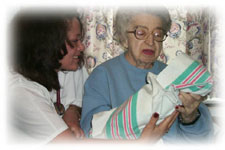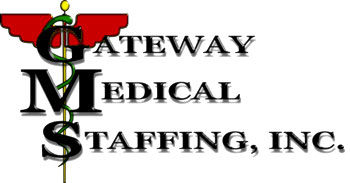Name:
|
|
Email:
|
|
|
1.
|
By understanding age-specific characteristics, we can_____.
|
|
|
Give all patients the exact same care.
|
|
|
Give all patients of the same age the same care.
|
|
|
Tailor care to the specific needs of the patient.
|
|
|
Take the care burden of physicians.
|
|
2.
|
If you notice confusion in a patient, it is ____.
|
|
|
Sometimes a sign of mental illness.
|
|
|
Always a sign of mental illness.
|
|
|
A proof that the patient cannot speak English well.
|
|
|
A proof that you are not explaining yourself well.
|
|
3.
|
Being uncomfortable with being touched is often a sign of ____.
|
|
|
A mental illness.
|
|
|
Marital problems.
|
|
|
Cultural differences.
|
|
|
A skin disease.
|
|
4.
|
After a few days, a normal neonate ____ .
|
|
|
Cannot open the eyes yet.
|
|
|
Can speak simple words.
|
|
|
Has no startle reflex.
|
|
|
Can smile in response to a smile.
|
|
5.
|
When talking to a neonate, it is best to speak ____.
|
|
|
Very loud.
|
|
|
In a soft and comforting voice.
|
|
|
Very quickly.
|
|
|
In complete sentences.
|
|
6.
|
Child car seats are ___.
|
|
|
Required by law in most states.
|
|
|
Very advisable, but not required by law.
|
|
|
Best if not secured to the car seat.
|
|
|
Always used in the front seat of the car.
|
|
7.
|
The separate self begins to develop at about ____.
|
|
|
Birth.
|
|
|
The first three years.
|
|
|
The fifth year.
|
|
|
Adolescence.
|
|
8.
|
If an infant seems slow to learn to crawl, you should ____.
|
|
|
Tell the parents that the infant should be tested for mental illness.
|
|
|
Tell the parents that the infant will probably never be a sports star.
|
|
|
Tell the parents that it is their fault.
|
|
|
Tell the parents that is perfectly normal.
|
|
9.
|
Handwashing should be emphasized to infants and their parents as a way to ____.
|
|
|
Encourage growth
|
|
|
Prevent disease transmission.
|
|
|
Keep a house clean.
|
|
|
Avoid mental illness.
|
|
10.
|
Toilet training usually takes place ____.
|
|
|
In the first year.
|
|
|
Before age 3.
|
|
|
From 4 to 6 years of age.
|
|
|
At about age 7.
|
|
11.
|
If a procedure is going to hurt, you should tell a child ____.
|
|
|
That it won't hurt at all.
|
|
|
That only babies cry at pain.
|
|
|
That they should be brave.
|
|
|
That it won't hurt for long.
|
|
12.
|
At what age should most children be given honest information about alcohol, drugs, and sexuality?
|
|
|
0-3
|
|
|
4-6
|
|
|
7-12
|
|
|
Only at the onset of adolescence.
|
|
13.
|
If you are going to be using medical equipment with a child ____.
|
|
|
Allow the child to explore it first.
|
|
|
Hide it until the last minute.
|
|
|
Discuss it but don't display it.
|
|
|
Have the parents appear to operate the equipment.
|
|
14.
|
At adolescence, risk-taking behavior ____.
|
|
|
Usually gives way to calmer thinking.
|
|
|
Is universally rejected by girls, but attracts boys.
|
|
|
Needs to be addressed.
|
|
|
Should be ignored.
|
|
15.
|
Peak age for testicular cancer is ____.
|
|
|
Late childhood.
|
|
|
20-35
|
|
|
40-55
|
|
|
Over 60
|
|
16.
|
For young adults, nutritional needs ___.
|
|
|
Focus on bone growth.
|
|
|
Focus on muscular growth.
|
|
|
Aren't yet important.
|
|
|
Shift from growth to health maintenance.
|
|
17.
|
When they confront early signs of disease, young adult have a tendency to ___.
|
|
|
Become fearful.
|
|
|
Deny them because they feel invulnerable.
|
|
|
Blame them on a spouse.
|
|
|
Ask detailed questions about them.
|
|
18.
|
The expression "sandwich generation" for middle adults means ____.
|
|
|
They are so buys they eat only fast foods.
|
|
|
They are caught between the needs of their own childhood and their own old age.
|
|
|
They are paying taxes but can't yet get Social Security benefits.
|
|
|
They are caught between caring for children and aging parents.
|
|
19.
|
Older adults often have to change roles because ____.
|
|
|
It is an adventurous age.
|
|
|
They taking acting classes.
|
|
|
A spouse had died.
|
|
|
They develop schizophrenic delusions.
|
|
20.
|
Persons over 80 _____.
|
|
|
Will always slip into senility.
|
|
|
Always develop depression.
|
|
|
Should be encouraged to give up active pursuits.
|
|
|
May lose some their sense of taste.
|
|
|



